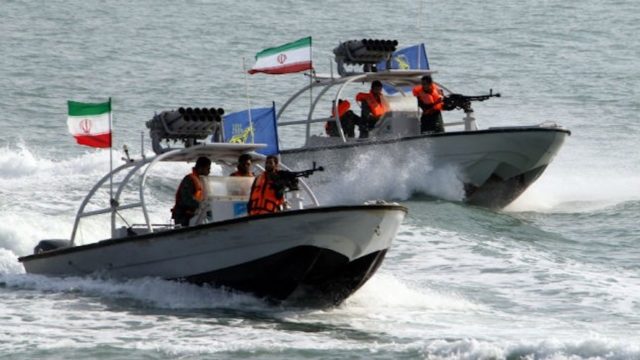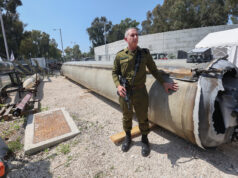The United States was humiliated this week when the USS Nitze came under simulated attack by four Iranian missile and torpedo-equipped speedboats in international waters. Despite American warnings, radio calls, flares and foghorns, two of the boats came within a few hundred yards of the Nitze. Iran is harassing American naval warships in the Persian Gulf while Washington refuses to acknowledge Iranian threats for reasons that are both political and practical.
The political reason is that Washington still entertains the idea that Iran can be a friend of America. This view, strongly held by the White House, State Department, Pentagon and CIA, is a true fantasy. No matter how many Iranian statements from top Iranian political and military leaders proclaim their total hatred of the United States, Washington persists in fostering the illusion. There is no immediate cure for a political disease: We have yet to invent an anti-regime-biotic that, when injected into the insane, returns them to normalcy.
As there is no solution, the Obama administration will explain the Persian Gulf incident as some sort of aberration or unauthorized action by the Iranian Revolutionary Guards, or a mistake, but not an act of overt hostility.
Second is the practical reason. The attack on the Nitze, described by the Navy and Pentagon as “unprofessional” and “unsafe,” actually was a test of an Iranian tactic called the “swarming boat” to destroy U.S. warships in the Persian Gulf.
The swarming boat attack is just what it sounds like: a number of fast boats equipped with missiles and torpedoes attack enemy ships from multiple angles to damage or destroy them as quickly as possible. Recently the Iranians added another dimension to the swarming boats: a vessel known as the Ya Mahdi, a remotely piloted fast patrol boat that can fire rockets or be stuffed with explosives. It is a new version of the boat that attacked the USS Cole in Aden in 2000 at a cost of 17 lives, 39 injuries and severe damage to the ship.
Fast patrol boats are maneuverable and operate up to 75 knots, making them hard to hit, particularly as they are built mostly of fiberglass, so they are not so easy to locate with radar. In addition, the defensive weapons on board most U.S. naval ships are inadequate. The old Mark 45 five inch guns fire too slowly and are not optimized against this kind of threat. They also are linked to aged fire control and radars that probably won’t pick up the patrol boats until they are in range to fire their missiles. The rapid-fire Phalanx gun, the gun of last resort on ships like the Nitze, has the same sensor-shooter problem, although some improvements have been made. It is questionable whether the Phalanx can actually stop an intense and multi-vessel attack.
Most important, none of these weapons can shoot down unguided rockets and missiles. The Phalanx fails because its range is too short and its ability to stop a high-speed kinetic round is very poor. And there is no good defense against torpedoes except to try and evade them, which is hard to do in a complex attack.
The Pentagon has known about this threat for a long time, and has opted to do next to nothing about it. Focused on big blue water operations, the Navy is behind a curve 20 years in the making.
Meanwhile, the Iranians keep improving the firepower of their fast patrol boats and adapt Western technology to further raise the threat level. They now have a semi-submersible fast patrol boat they acquired from North Korea and improved. This carries significant firepower and is hard to find and hit. They have taken British technology from the superfast Bladerunner speedboat and turned it into the Seraj-1, which exceeds 55 knots on the surface. A newer version, thought to be the Seraj-2, may reach 80 to 85 knots, far faster than anything in the U.S. inventory. And the Iranians appear able to acquire diesel engines, surface drives and other sophisticated gear from Western sources without any practical interference.
The Pentagon needs to get its act together and come up with tactics and weapons systems to solve the problem of swarm boat attacks. So, too, must the administration stop pretending Iran is not a real threat. Above all, it is time to end America’s humiliation on the high seas.







